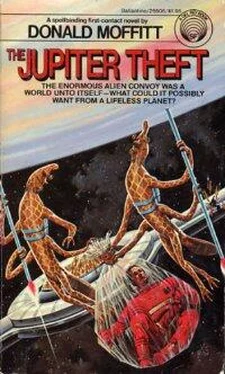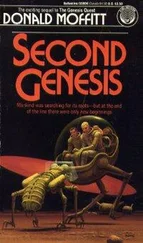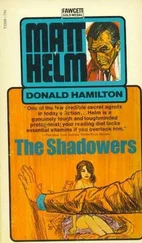“This is like sneaking through the sewers of Paris in an old novel by Victor Hugo,” Ruiz observed, “while thousands of Parisians are walking around a few feet overhead.” Then he had to explain who Victor Hugo was.
The route they followed was a tangled confusion of pipes, enormous three-sided ducts and twisting cables as thick around as oak trees. They passed through narrow chimneys of metal that they had to squeeze through inch by inch, and yawning spaces that seemed to have been wasted in the design of the ship. Jameson was reminded of just how old the ship must be; some of the chambers they traversed had been used for various purposes and abandoned by past generations of Cygnans. The dust of centuries lay on the crumbling artifacts that loomed in the flickering dimness provided by skeins of leaking optical fibers.
“Cygnans are sloppy housekeepers,” Jameson said at one point, looking at an electrical cable that had been gnawed clean through by some small animal. “They never repaired this.”
“The function it served might have disappeared a thousand years ago,” Ruiz said. “Do we maintain the Roman aqueducts, or the transatlantic cables?”
There was life all around them in the unused spaces—little furry things that fled chittering as they approached. Mosslike fungus grew near damp spots where pipes had burst or condensation beaded the walls. Once they saw a small flying thing—a podlike shape suspended from a crown of furiously beating transparent wings.
The ducts and conduits branched off like some immense fossil vine to disappear through bulkheads or snake their way through side tunnels and adjacent chambers. Once Jameson put his eye to a rent that showed light and saw a horde of Cygnans slithering across a floor to crowd around a dozen raised perches where other Cygnans dispensed tiny pea-green cubes from wide-mouthed baskets slung around them. Another time the feathery humanoids stopped Dmitri just in time to prevent him from stepping through an opening where Cygnans disembarked from a travel tube to a platform that debouched to a multibranched artery.
It was the humanoids that kept them out of trouble. They darted ahead and then back like coursing gazehounds, sniffing out danger and herding Jameson and the others into side tunnels, or by example making them hide behind ducts and bulkheads till stray Cygnans passed. And all the time, the two elvish beings followed the trail of Klein and his group, selecting trails from among alternate routes with utter certainty.
“Butyric acid,” Dmitri said suddenly.
“What?” Jameson called.
“Butyric acid. It’s a constituent of human sweat. Every time you take a step, something like two hundred and fifty billion molecules of butyric acid pass through the sole of your shoe. A good bloodhound or German shepherd can detect a millionth of that amount and follow a trail a week old. These two fluffballs of ours seem to live by scent.”
“Very interesting. But we haven’t time to—”
“There’s something else.”
“What are you talking about?”
Ruiz and Maggie had stopped to listen. The two humanoids were twenty feet farther on, dancing impatiently up and down.
“How do they make us hide when there are Cygnans nearby?” Dmitri asked.
Jameson wrinkled his brow. “Why … they make a lot of gestures, and they act excited, and then they hide behind something…”
“Think again. We don’t wait around and stop to think. We act very quickly. They tell us Cygnans are around.”
Maggie said, “Well, we seem to sense what they mean. I can almost feel us getting close to Cygnans … Oh!”
Dmitri grinned with triumph. “Exactly. It’s the most evocative of the senses. Human beings use it every day without being aware of it. It makes us like people or dislike them, triggers sexual behavior, evaluates our surroundings on a subconscious level, makes us nostalgic without knowing why—”
“Slow down,” Jameson said.
“He’s too much of an ox to notice,” Maggie said. She turned to Jameson and said: “ Smell! They tell us by smell! When they want to warn us that there are Cygnans around, they lose that nice spicy aroma and they suddenly smell sort of musty, the way Cygnans do.”
Dmitri nodded vigorously. “They manufacture smells as well as detect them. They probably can imitate any smell they encounter. Make up new ones, too.” He laughed delightedly. “Odors to order!”
“Maybe,” Jameson said. “Come on, we’re wasting time.”
“I’ll show you,” Dmitri said.
He hurried to catch up to the humanoids, the others following. The two creatures were at a division in the metallic gorge where two narrow flumes diverged, making motions to go right. Dmitri ignored them and turned left.
“What—” Jameson began.
“Watch,” Dmitri said. “Or I should say, smell.”
The little creatures squeaked with distress. After a couple more attempts to turn Dmitri around, they planted themselves at the right, waving their pink tails in agitation.
It hit Jameson with full force. A smell like old socks. A locker room with a million sweaty feet. The lemurlike creatures were fanning it toward the three humans with their bushy tails.
“I’m convinced,” Jameson said. To the evident relief of the humanoids, the humans began following them up the metal flume, climbing the thick vinelike cables. In the low gravity, it was easy.
Ruiz, his jury-rigged spear slung across his back, inquired between puffing breaths: “Why would any critter develop an ability like that?”
“Any number of biological reasons,” Dmitri said happily “Carnivorous plants make themselves smell like rotten meat to attract flies. Moths generate pheromones to attract mates. Deer deposit scents to warn other deer of danger. Rabbits mark their territories with scent glands to keep other rabbits out. Skunks protect themselves with odors. All different ways of using scents to communicate or modify the behavior of other creatures.” He stopped. “I just had a thought.”
“What?”
“Why do we like them?”
“Because they’re cute! ” Maggie called from above.
“What if that nice spicy smell you like so much isn’t their natural aroma? What if it’s tailor-made to influence our attitude toward them?”
Ruiz said, “How could they know what appeals to us? Different life form, different planet, entirely out of their biological spectrum.”
“Feedback,” Dmitri said. “They respond to all the billions of scent molecules we’re putting out from our skin, our mouths, our gonads, our intestinal tracts. Their olfactory organs analyze them as naturally as our own eyes put together a lot of data and give us the shape of the world around us. Then their scent glands mix up a brew that gets the response they want.”
Jameson grunted. “Scents couldn’t affect us that powerfully.”
“Couldn’t they? The smell of a baby can bring on a maternal response in a nonlactating female. The presence of menstruating females in a group living situation can bring on a woman’s period. A man can make you want to fight him by the smell of his fear, or back down by the smell of his rage. Do you know that a cat has a scent gland on its forehead that—”
“All right!” Jameson said. “I give up!”
“It doesn’t have to be sinister, you know,” Dmitri said, mollified. “They needed our help, and they instinctively tried to make themselves pleasing.”
Up above, the two pink forms were swinging themselves up the braided cables and optical fibers like a pair of cotton-candy monkeys. The vertical crevice twisted and widened into a dim grotto filled with the shrouded shapes of corroded machines that resembled rusty twelve-foot-high beehives. The dust, thick on the floor, showed the tracks of many humans. There was a litter of empty cans to show where they’d stopped to camp, and from somewhere behind the hives came the unmistakable smell of human waste.
Читать дальше












